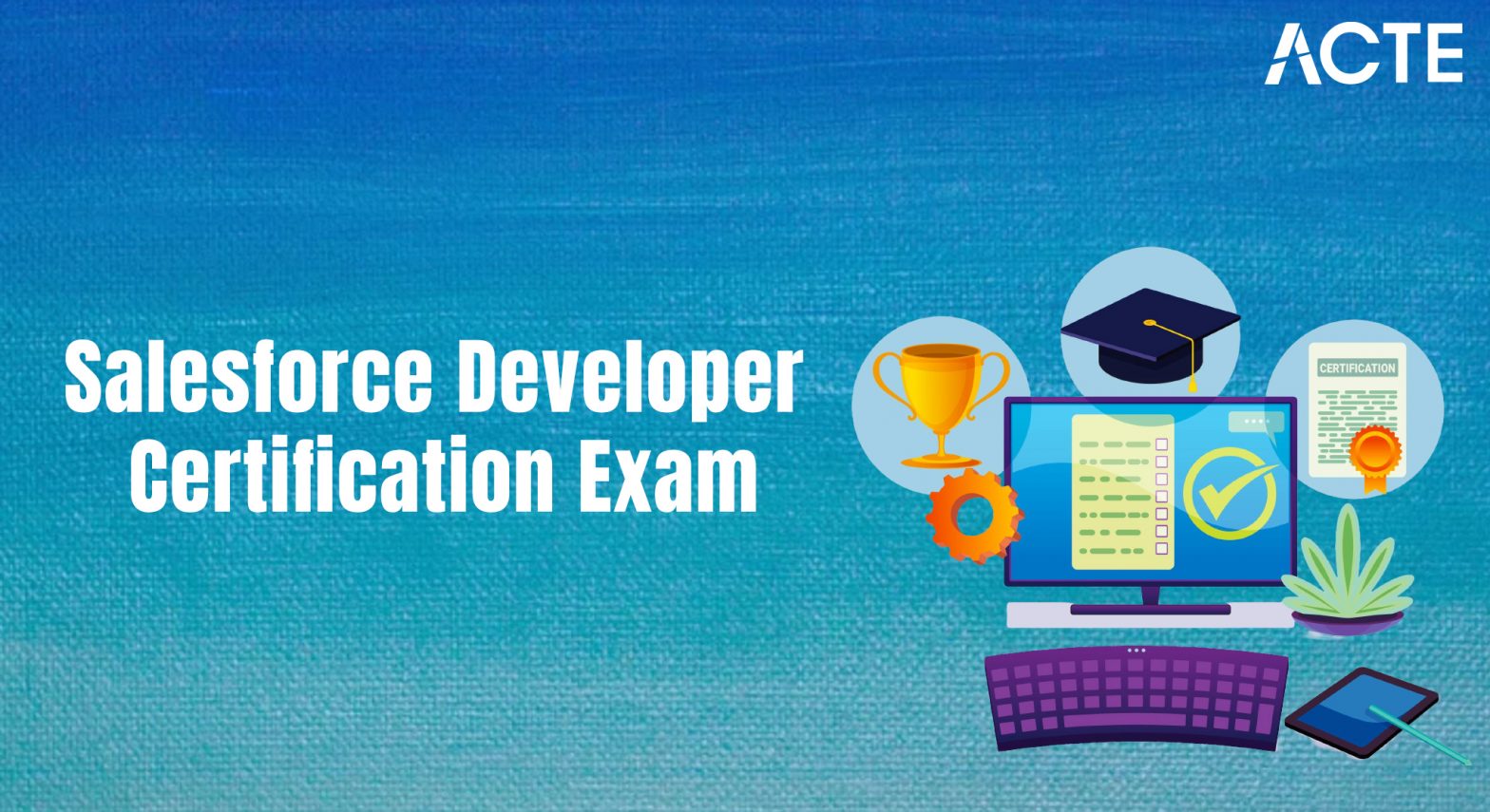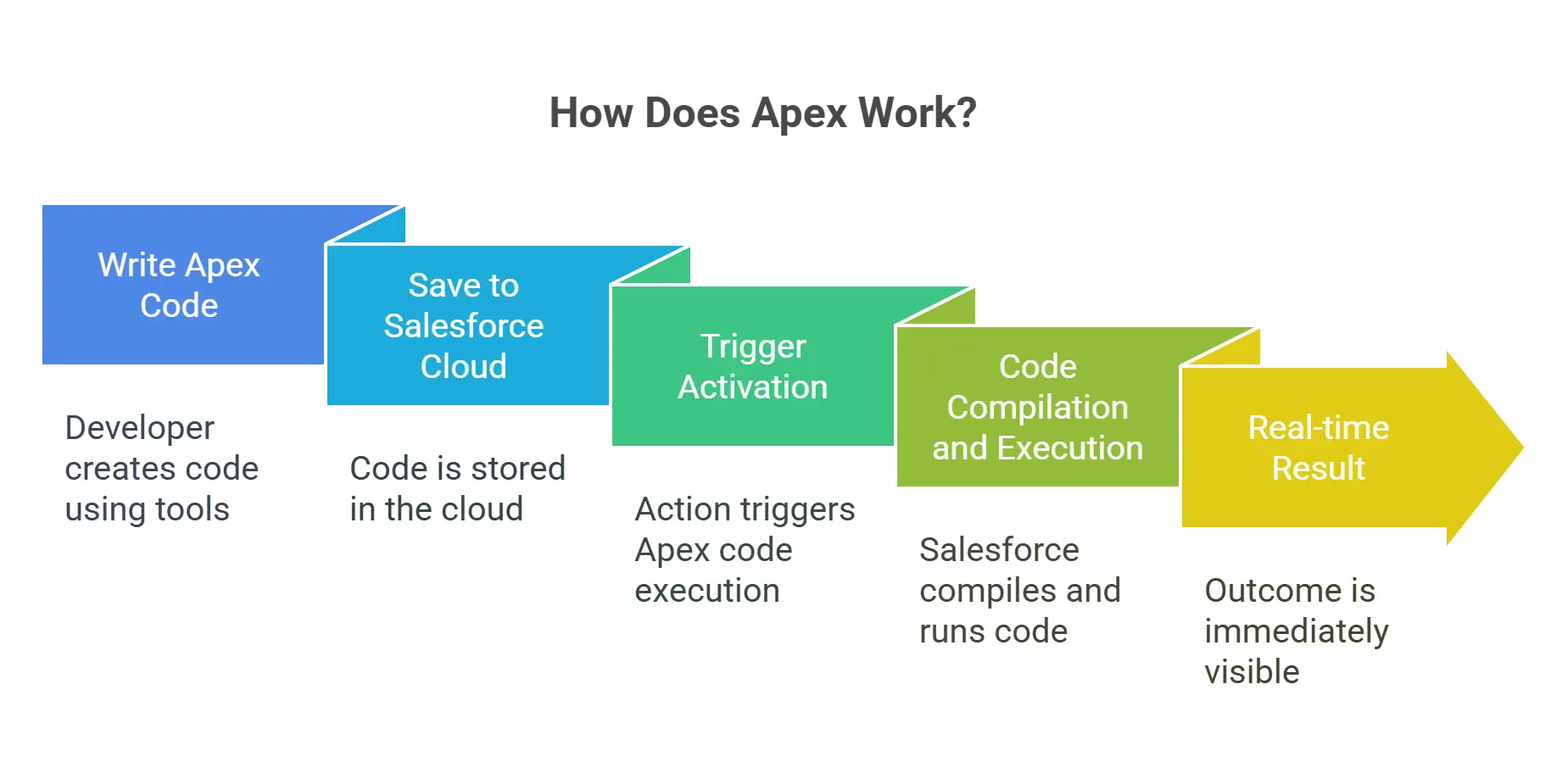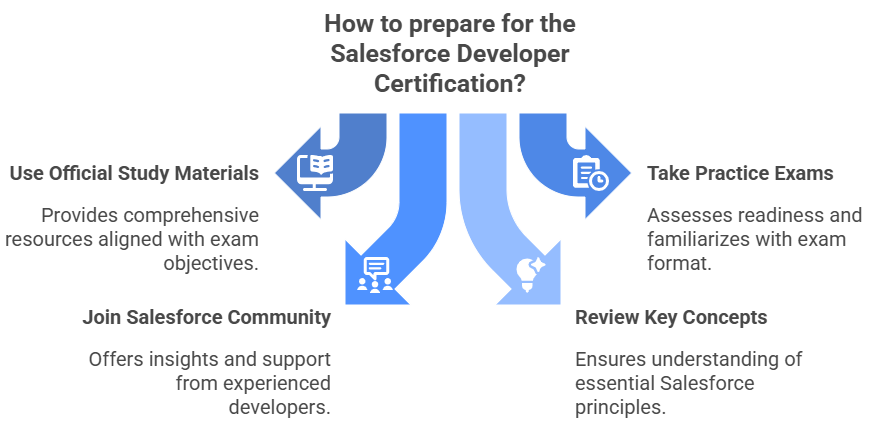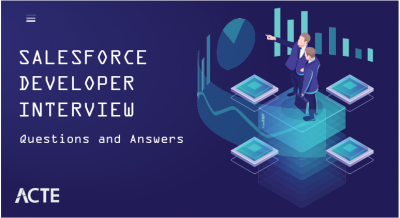
- Introduction to Salesforce Developer Certification
- Exam Overview and Structure
- Eligibility and Prerequisites
- Key Topics Covered in the Exam
- Apex Programming Concepts
- Triggers and Batch Processing
- Visualforce and Lightning Components
- Exam Preparation Tips and Strategies
- Sample Questions and Practice Tests
- Certification Maintenance Requirements
- Career Benefits of Developer Certification
Introduction to Salesforce Developer Certification
The Salesforce Developer Certification is a highly regarded credential for professionals seeking to demonstrate their expertise in developing applications on the Salesforce platform. This certification validates a developer’s ability to design, build, test, and deploy custom applications using Salesforce’s powerful suite of tools, such as Apex, Visualforce, and Lightning components. The certification exam focuses on key areas, including object-oriented programming concepts, security, data modeling, and application logic, as well as integration techniques and troubleshooting. For more information, check out Salesforce Training. By earning the Salesforce Developer Certification, individuals gain recognition in the competitive Salesforce ecosystem, unlocking career opportunities and enhancing their professional credibility. With a growing demand for Salesforce developers across various industries, this certification serves as a solid foundation for those looking to specialize in Salesforce development and advance in their careers. Whether you’re looking to switch careers or solidify your expertise, this certification proves your proficiency in Salesforce’s vast and evolving landscape. Successful completion of the certification exam demonstrates your capability to create robust, scalable applications while adhering to best practices, making you a valuable asset to organizations leveraging Salesforce for their business operations.
To Explore Salesforce in Depth, Check Out Our Comprehensive Salesforce Training To Gain Insights From Our Experts!
Exam Overview and Structure
The Salesforce Developer Certification exam is designed to assess a candidate’s proficiency in developing applications on the Salesforce platform. The exam consists of 60 multiple-choice questions, which must be completed within a 105-minute time frame. It is a comprehensive assessment, covering a variety of topics including Apex programming, Visualforce pages, Lightning components, data modeling, application logic, security, and integration techniques. The exam is divided into several key areas, with each section contributing a different percentage to the total score. Topics such as Salesforce fundamentals, debugging, and testing techniques, as well as user interface customization, are essential for achieving a passing score. A solid grasp of Understanding the Salesforce Security Model is also crucial. To pass the exam, candidates need to demonstrate a strong understanding of how to create efficient, scalable, and secure applications using Salesforce’s native tools. The passing score for the exam is typically set at 65-70%, depending on the version. Candidates should thoroughly review Salesforce’s study materials and resources, such as the official Salesforce Developer Guide and online practice exams, to prepare effectively. The exam is available online through web-based proctoring, making it accessible from anywhere. Candidates need to stay up to date with the latest Salesforce updates, as the platform is continuously evolving with new features and best practices.
Eligibility and Prerequisites
- Experience with Salesforce: While there is no formal requirement, at least 1-2 years of practical experience in Salesforce development is recommended.
- Understanding of Apex: A good grasp of the Apex programming language, which is central to Salesforce development, is essential for the exam.
- Familiarity with Visualforce and Lightning Components: Knowledge of creating user interfaces using Visualforce and Lightning components is crucial for the exam.
- Data Modeling & Security: An understanding of data modeling, relationships, security, and sharing rules is important for creating efficient and secure applications. Explore the Salesforce Certification path roadmap to guide your learning journey.
- Salesforce Platform Fundamentals: A solid foundation in the Salesforce platform, including its architecture, declarative and programmatic tools, is necessary.
- Practice & Study Resources: Reviewing Salesforce study materials, using online practice exams, and engaging with the Salesforce developer community can help candidates prepare effectively for the exam.
To be eligible for the Salesforce Developer Certification exam, candidates should have a solid understanding of Salesforce development concepts and experience working with the platform. While there are no strict prerequisites for taking the exam, having hands-on experience and knowledge in certain areas will significantly enhance your chances of success. Here are the key eligibility and prerequisites for the certification:
Do You Want to Learn More About Salesforce? Get Info From Our Salesforce Training Today!
Key Topics Covered in the Exam
The Salesforce Developer Certification exam covers a broad range of key topics that assess a candidate’s ability to develop, customize, and manage applications on the Salesforce platform. Central to the exam are Apex programming and Visualforce for building business logic and custom user interfaces. Candidates must be proficient in data modeling, which includes understanding relationships between objects, schema design, and how to manage large datasets efficiently. Gaining expertise in Mastering Salesforce Queues can further enhance your ability to manage records effectively. Security and access control are also vital, as developers must know how to implement user profiles, roles, permission sets, and sharing rules to ensure data security and privacy. The exam also tests knowledge in process automation using tools like Process Builder and Flows to automate business processes. Additionally, Lightning components and Lightning Web Components (LWC) are heavily featured, as these are essential for modern UI development on Salesforce. Integration techniques are critical, as developers need to understand how to connect Salesforce with external systems using REST and SOAP APIs. Finally, testing and debugging skills are evaluated, as developers are expected to know how to write test classes, execute unit tests, and troubleshoot issues effectively within the Salesforce platform. Mastery of these topics ensures that candidates can design, build, and maintain high-quality Salesforce applications.
Apex Programming Concepts
- Apex Syntax and Structure: Apex follows a similar syntax to Java, so understanding its structure, including variables, methods, loops, and conditional statements, is foundational for writing effective code.
- Triggers: Apex triggers are used to automate processes in Salesforce. Developers should be proficient in writing triggers to respond to changes in Salesforce records, such as insertions, updates, and deletions.
- Apex Classes and Methods: Apex classes are used to group related code into objects, while methods define the specific functionality of that class. Understanding how to structure these components is vital for clean, reusable code. To see where these skills can take you, Explore Salesforce Careers.
- DML Operations: Data Manipulation Language (DML) operations in Apex allow developers to insert, update, delete, and query Salesforce records. Proficiency in performing efficient DML operations is crucial for interacting with Salesforce data.
- Governor Limits: Apex operates within certain limits to maintain platform performance. Developers need to be aware of and work within these governor limits (e.g., limits on queries, records processed, and CPU time).
- Unit Testing: Writing test methods to ensure that Apex code functions as expected is essential. Apex requires at least 75% code coverage for deployment, making unit testing and test-driven development important practices for any Salesforce developer.
Apex programming is a crucial skill for Salesforce developers, as it allows for the customization and automation of business logic on the Salesforce platform. Here are key Apex programming concepts that are essential for the Salesforce Developer Certification:

Triggers and Batch Processing
Triggers and batch processing are essential aspects of Apex programming in Salesforce, enabling developers to automate processes and handle large data volumes efficiently. Triggers are snippets of Apex code that execute in response to specific changes in Salesforce records, such as insertions, updates, or deletions. They allow developers to enforce business logic, such as updating related records or validating data, automatically when a change occurs in the database. To understand where the platform is headed, check out The Future of Salesforce. Understanding when to use before and after triggers is crucial for managing operations efficiently. Batch processing, on the other hand, is used to process large volumes of data in smaller, manageable chunks, ensuring that operations remain within Salesforce’s governor limits. It’s particularly useful when dealing with operations like data migrations, large-scale updates, or complex calculations that exceed the limits of standard operations. You can deepen your understanding through Salesforce Training. Batch classes in Apex are divided into three parts: the start method to define the records to process, the execute method to handle the batch logic, and the finish method to handle post-processing tasks. Mastery of triggers and batch processing is essential for Salesforce developers to ensure that applications are both efficient and scalable, especially when working with large datasets or complex business requirements.
Visualforce and Lightning Components
Visualforce and Lightning Components are key tools for creating custom user interfaces on the Salesforce platform. Visualforce is a framework that allows developers to build custom pages with HTML, CSS, and Apex, giving them full control over the look and feel of the user interface. Visualforce pages can be integrated with Salesforce data and logic, enabling dynamic, data-driven user experiences. Enhance your development skills by Mastering Salesforce CLI. It uses a markup language similar to HTML, and developers can embed Apex code to implement business logic on the page. While Visualforce remains an important tool for legacy systems, Lightning Components is the modern UI framework that offers enhanced performance and a more dynamic, responsive design. Built using JavaScript and the Lightning Component Framework, Lightning Components allow developers to create reusable, modular components that can be assembled into sophisticated user interfaces. The Lightning framework is designed for better performance, mobile-first development, and a seamless user experience. Components can communicate with each other, share data, and interact with Salesforce data using Lightning Data Services or Apex. Mastering both Visualforce and Lightning Components is essential for Salesforce developers to build customized, scalable, and user-friendly applications that meet modern business needs and provide an optimal experience across devices.
Preparing for a Salesforce Job Interview? Check Out Our Blog on Salesforce Interview Questions and Answers
Exam Preparation Tips and Strategies
- Understand the Exam Objectives: Review the exam guide and breakdown of key topics to understand the areas covered. Focus on mastering the most critical subjects such as Apex, triggers, Lightning components, and data modeling.
- Hands-on Practice: The best way to prepare for the exam is through practical experience. Spend time building applications on the Salesforce platform, writing Apex code, creating triggers, and working with Lightning components to reinforce your theoretical knowledge.
- Use Official Study Materials: Salesforce provides comprehensive study resources, including the official study guide, online courses, and documentation. These resources are aligned with the exam objectives and offer in-depth explanations. To learn more about the role, check out What is a Salesforce Developer
- Take Practice Exams: Practice exams are invaluable for assessing your readiness. They help you familiarize yourself with the exam format, time constraints, and identify areas where you may need further review.
- Join the Salesforce Community: Engage with the Salesforce developer community through forums, groups, and blogs. You can ask questions, share experiences, and gain insights from others who have already taken the exam.
- Review Key Concepts and Best Practices: Focus on understanding key Salesforce concepts, such as governor limits, data security, and testing strategies. Be sure to review the best practices for Apex code and trigger development, as these are frequently tested areas.

Sample Questions and Practice Tests
Sample questions and practice tests are invaluable tools for preparing for the Salesforce Developer Certification exam. They provide a realistic preview of the exam format and question types, allowing candidates to assess their knowledge and identify areas for improvement. Practice tests typically cover a wide range of topics, including Apex programming, triggers, Visualforce, Lightning components, and data modeling, offering a comprehensive review of the key concepts. For detailed guidance, see the Ultimate Salesforce Admin Certification Guider. By simulating the actual exam environment, practice tests help build familiarity with the timing and pressure of completing the test within the allotted time. Additionally, they allow you to pinpoint weak areas in your understanding so you can focus your study efforts more effectively. Many official Salesforce study materials, as well as third-party platforms, offer sample questions and full-length practice exams designed to mimic the real exam. Engaging with these resources regularly will help boost confidence, reinforce learning, and improve problem-solving skills, ensuring you’re well-prepared for the certification exam.
Certification Maintenance Requirements
- Release Management: Salesforce frequently releases updates and new features, and certified professionals are required to stay up-to-date with these changes to maintain their certification. This ensures that their skills align with the latest platform capabilities.
- Trailhead Maintenance: Salesforce offers Trailhead as the primary platform for learning and staying updated. Certified individuals must complete specific maintenance modules on Trailhead to renew their certification. These modules typically cover new Salesforce features and best practices.
- Maintenance Exams: Salesforce may require completion of a maintenance exam after each release to validate your knowledge of new tools and features. These exams are usually free and available online. You can prepare using the Salesforce Trailhead guide.
- Annual Renewal: Certification typically needs to be renewed every year to maintain its validity. This is done by completing maintenance modules or exams, which help ensure that your knowledge stays current.
- Certification Status: Salesforce tracks the status of your certification through your Trailblazer Profile, where you can see the upcoming maintenance requirements and completion deadlines.
- Failure to Maintain: If you don’t complete the necessary maintenance within the required time frame, your certification may expire, and you will need to recertify by taking the full exam again.
Would You Like to Know More About Salesforce? Sign Up For Our Salesforce Training Now!
Career Benefits of Developer Certification
Earning the Salesforce Developer Certification can offer significant career benefits, positioning you as a highly skilled professional in the rapidly growing Salesforce ecosystem. The certification demonstrates your expertise in developing, customizing, and optimizing applications on the Salesforce platform, making you a valuable asset to organizations that rely on Salesforce for customer relationship management (CRM) and business operations. Certified developers often experience greater career opportunities, as they are in high demand by companies seeking to leverage Salesforce’s robust capabilities. Additionally, Salesforce developers typically command higher salaries compared to their non-certified peers, as their specialized skills are seen as a critical investment for businesses looking to maximize the potential of the platform. Learn more through Salesforce Training. The certification also opens doors for career advancement, providing pathways to senior roles, project leadership positions, or even Salesforce consulting opportunities. Beyond the immediate job advantages, becoming a certified Salesforce developer helps build credibility and confidence, as it reflects a commitment to professional growth and expertise in the field. By joining the Salesforce developer community, certified individuals gain access to networking opportunities, resources, and continuous learning, ensuring that they stay ahead in a competitive and ever-evolving technology landscape.




